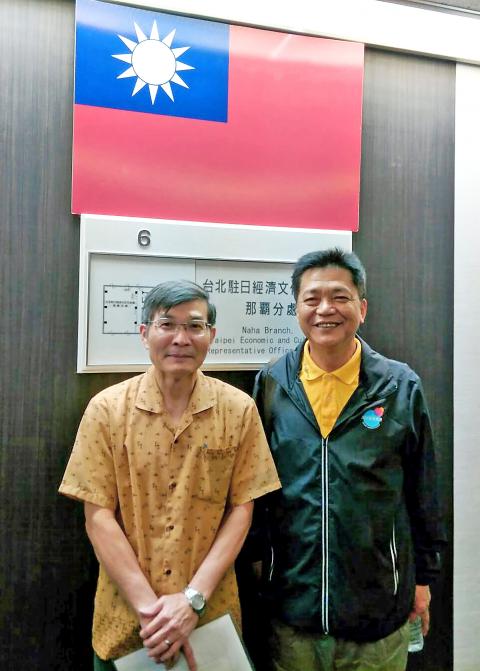Su Chii-cherng (蘇啟誠), director-general of the Osaka branch of the Taipei Economic and Cultural Office, committed suicide early yesterday at his residence, the Ministry of Foreign Affairs said, just one week after his office was accused of indifference to the plight of Taiwanese stranded in the area in the wake of Typhoon Jebi.
The ministry issued a statement expressing its deepest grief and regret over the loss of Su, 61, who assumed leadership of the office in July.
He previously served as director-general of the office’s Naha branch and as deputy secretary-general of what is now called the Taiwan-Japan Relations Association.

Photo: CNA
“Director Su was a hardworking and responsible diplomat. He had done a remarkable job during his diplomatic career and was always willing to mentor the nation’s younger diplomats,” the ministry said. “We are extremely saddened by his passing.”
The ministry said it would do everything it can to assist Su’s family and urged the public to respect their privacy.
Local media have reported that Su’s suicide was linked to work pressure, presumably caused by an outpouring of criticism due to the office’s perceived lack of assistance for Taiwanese who were affected by Jebi.
The ministry declined to comment on the allegations.
A netizen said they last week telephoned the Osaka office to ask whether it could help them find accommodation, to which a staff member allegedly responded: “How could I help you with that? Where you want to stay is your own choice.”
Criticism increased further after a false report emerged that the Chinese embassy in Japan sent tour buses to pick up Chinese tourists stuck in Osaka’s Kansai International Airport.
Minister of Foreign Affairs Joseph Wu (吳釗燮) on Wednesday said that changes are needed in the emergency response mechanism at the representative offices in Japan.
The heads of the offices were originally scheduled to meet in Osaka today to discuss ways to revise its emergency response protocols.
Representative to Japan Frank Hsieh (謝長廷) flew to Osaka after learning of Su’s suicide and issued a news release lamenting the diplomat’s death.
“People have been comparing what the Osaka office did to help tourists stranded in Kansai International Airport with what the Chinese embassy did, placing staff at the office under tremendous pressure,” Hsieh said.
Staff at the offices did their utmost to help in the wake of Jebi and a magnitude 6.6 earthquake that struck Hokkaido on Thursday last week, Hsieh said, adding that their hard work should be justly recognized.
The Presidential Office said that President Tsai Ing-wen (蔡英文) has instructed the ministry to do everything possible to assist Su’s family, and expressed sorrow and condolences over the diplomat’s death.
Additional reporting by Lin Tsuei-yi and CNA

INVESTIGATION: The case is the latest instance of a DPP figure being implicated in an espionage network accused of allegedly leaking information to Chinese intelligence Democratic Progressive Party (DPP) member Ho Jen-chieh (何仁傑) was detained and held incommunicado yesterday on suspicion of spying for China during his tenure as assistant to then-minister of foreign affairs Joseph Wu (吳釗燮). The Taipei District Prosecutors’ Office said Ho was implicated during its investigation into alleged spying activities by former Presidential Office consultant Wu Shang-yu (吳尚雨). Prosecutors said there is reason to believe Ho breached the National Security Act (國家安全法) by leaking classified Ministry of Foreign Affairs information to Chinese intelligence. Following interrogation, prosecutors petitioned the Taipei District Court to detain Ho, citing concerns over potential collusion or tampering of evidence. The

Seventy percent of middle and elementary schools now conduct English classes entirely in English, the Ministry of Education said, as it encourages schools nationwide to adopt this practice Minister of Education (MOE) Cheng Ying-yao (鄭英耀) is scheduled to present a report on the government’s bilingual education policy to the Legislative Yuan’s Education and Culture Committee today. The report would outline strategies aimed at expanding access to education, reducing regional disparities and improving talent cultivation. Implementation of bilingual education policies has varied across local governments, occasionally drawing public criticism. For example, some schools have required teachers of non-English subjects to pass English proficiency

NEGOTIATIONS: The US response to the countermeasures and plans Taiwan presented has been positive, including boosting procurement and investment, the president said Taiwan is included in the first group for trade negotiations with the US, President William Lai (賴清德) said yesterday, as he seeks to shield Taiwanese exporters from a 32 percent tariff. In Washington, US Trade Representative Jamieson Greer said in an interview on Fox News on Thursday that he would speak to his Taiwanese and Israeli counterparts yesterday about tariffs after holding a long discussion with the Vietnamese earlier. US President Donald Trump on Wednesday postponed punishing levies on multiple trade partners, including Taiwan, for three months after trillions of US dollars were wiped off global markets. He has maintained a 10 percent

TRADE: The premier pledged safeguards on ‘Made in Taiwan’ labeling, anti-dumping measures and stricter export controls to strengthen its position in trade talks Products labeled “made in Taiwan” must be genuinely made in Taiwan, Premier Cho Jung-tai (卓榮泰) said yesterday, vowing to enforce strict safeguards against “origin laundering” and initiate anti-dumping investigations to prevent China dumping its products in Taiwan. Cho made the remarks in a discussion session with representatives from industries in Kaohsiung. In response to the US government’s recent announcement of “reciprocal” tariffs on its trading partners, President William Lai (賴清德) and Cho last week began a series of consultations with industry leaders nationwide to gather feedback and address concerns. Taiwanese and US officials held a videoconference on Friday evening to discuss the